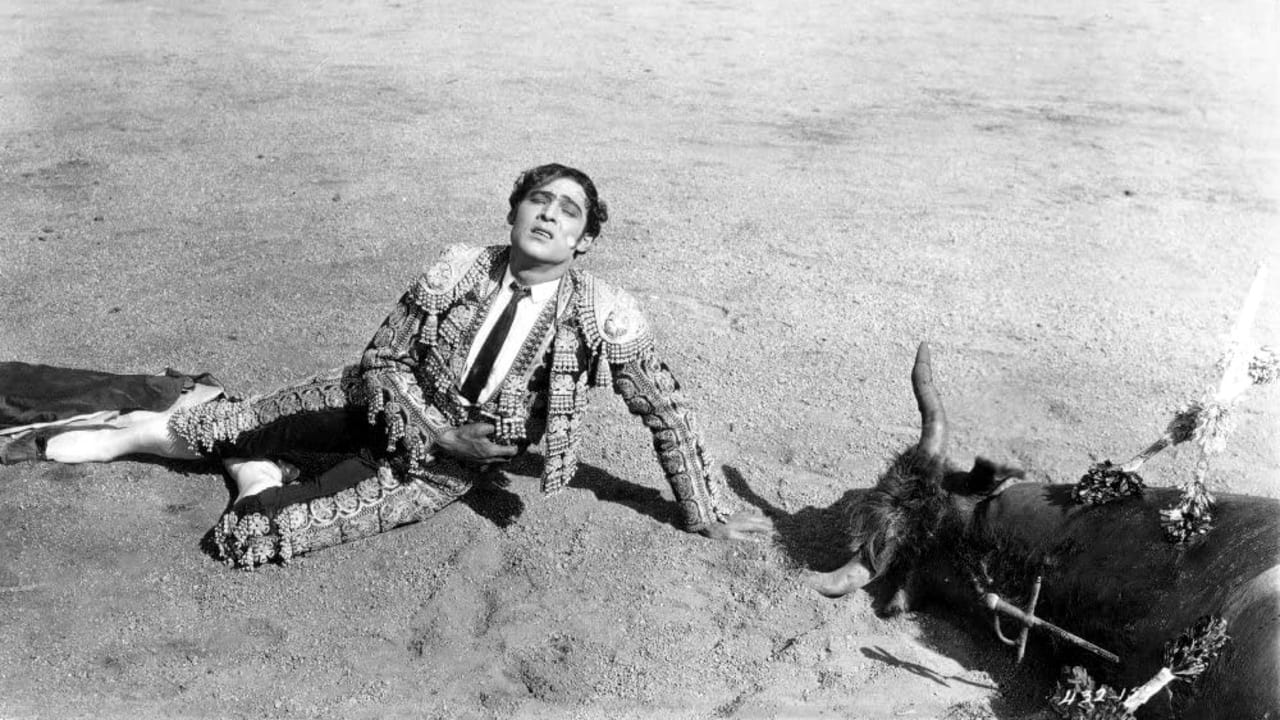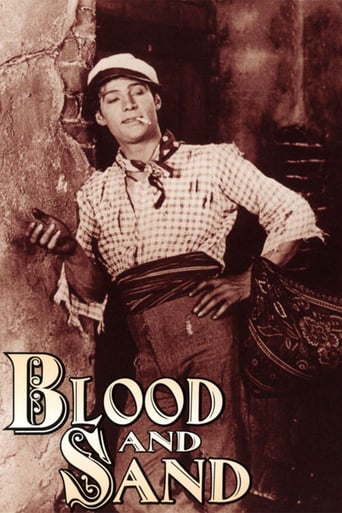

"Blood and Sand" tells us many times how cruel and dangerous it believes bullfighting to be, but in terms of what it actually shows us, it seems far more interested in the romantic qualities of Rudolph Valentino and his larger-than-life love triangle.Valentino gives a legitimately good performance, but even the love story loses some of its immediacy from the fact that "Blood and Sand" takes its subject at some distance, periodically stepping back and focusing on the scholar who foreshadows the matador's end. This also allows some of the characterization to go without being fully realized. When all is said and done it is neither believable as an anti-bullfighting film nor totally involving as a story of a love triangle, but some of the elements, including the performances and some excellent symbolic imagery, are well realized.
... View MoreImpoverished shoemaker's son Rudolph Valentino (as Juan Gallardo) wants to be a bullfighter, much to his widowed mother's dismay. Still, toreador Valentino excels in the dangerous sport; and, later, he is wealthy and famous throughout Spain. Along the way, he marries virtuous childhood sweetheart Lila Lee (as Carmen). For Valentino, temptation accompanies fame, as he falls under the spell of wicked temptress Nita Naldi (as Doña Sol), a slightly sadomasochistic bullfighting groupie. Can Valentino love two women at the same time? Valentino performs well as an innocent ragamuffin who achieves great fame; of course, this parallels the idolization of the film's star. Moreover, the Idol proves just as attractive being seduced (herein, by Ms. Naldi) as he was the seducer (in the recent "Sheik"). Fred Niblo's "Blood and Sand" is a classic; however, the story, and disjointed bullfighting footage, do bog things down.Great things happen, after about a quarter hour, when Valentino steps into Naldi's lair. In a neat bit of acting business, Valentino wipes a sweaty hand before greeting his seductress; then, he and Naldi's servant exchange weird looks as Valentino gets his cigarette lighted. After some crosscutting to innocent Ms. Lee, Naldi's harp-playing gets her man.Writer June Mathis adapts well, for her star; but, the Ibáñez story should have more streamlined. Combining, or further developing, the characters played by Charles Belcher (Don Joselito) and Walter Long (Plumitas) might have helped. Mr. Belcher's character is most interesting; he collects torture devices, and choruses the film's thesis: "Happiness and prosperity built on cruelty and bloodshed cannot survive." ******* Blood and Sand (8/5/22) Fred Niblo ~ Rudolph Valentino, Lila Lee, Nita Naldi, Charles Belcher
... View MoreA vehicle for Rudolph Valentino, who is magnetic enough almost to make up for the banal plot and the confused characterization. As the son of a cobbler turned famous bullfighter, Valentino swaggers, poses, moves gracefully, tosses his head, dresses in foreign costumes, and lowers his head so he can look smoulderingly out of those big, dark eyes. But he also recoils from the dancing girl who tries to kiss him after they've been dancing a fiery dance with castanets and everything, with a quivering look of disgust, lip curled, flared nostrils, the works. He is swoony over his wife, and then over the bad woman, whose house is strangely orientalMoorish, I suppose. He is confident in public at one moment and a shy rube at another, and a lot of the time with the bad woman he seems to have been, well, unmanned, dominated by her will (symbolized by a serpent ring she gives him). Of course things do not go well, and his friend and alter-ego the bandit is shot at the arena and Juan is gored. Probably Valentino fans were not looking for a coherent story linejust a lot of great images of his face and form. It might as well be a fumetto. The film-makers preface the story with a fake disclaimer about the cruelty of bull-fighting, which they touch on every once in a while with the fulminations of an old priest or philosopher who rails with unspanish heat about the curse of the cruel sport. It's fake because the film itself loves the ritual and costume and excitement, and Valentino looks great in the Toreador suit.
... View MoreWith the exception of Julio in "The Four Horsemen of the Apocalypse," Juan Gallardo is perhaps the most three dimensional role Rudolph Valentino ever played. The story is familiar, even predictable enough: a young Spaniard is born poor, achieves fame and fortune as a matador, marries a nice convent girl, is beguiled by a truly nasty society woman (who basically collects and discards him), loses his will to fight in the arena and dies soon after a reconciliation with his long suffering wife. But Valentino brings this rather clichéd character to life: he is convincing as the happy go lucky, apparently shiftless teenaged Juan, as the young man celebrated as the greatest bullfighter in Spain, confident and thoroughly enjoying his new wealth and fame, as the besotted wooer of his childhood friend Carmen, and as the suddenly uncertain, ill at ease lover of the wealthy Dona Sol whom he nonetheless cannot free himself from. (At times his degradation suggests that of the professor in "The Blue Angel.") His range is perhaps most apparent in the love scenes: he is tender and considerate when he is caressing his nervous bride on their wedding night but sadistic and brutish when taunted by his kinky mistress who wants him to beat her (the dialogue here is undeniably purple at one point Juan calls Dona Sol "a serpent from hell"but it somehow fits Juan's basic personality which is impassioned and unsophisticated). Valentino even gets to show his flair for comedy when he romps with the little boys who play his nephews. In short, his wide ranging performance in "Blood and Sand" puts to the rest the myth that as a actor he can do little more than wear clothes well and glare.However, although Valentino's performance is compelling, there are problems with "Blood and Sand" that keep it from being a truly great film. First, considering that this is a movie about bull fighting, the fighting scenes were, unfortunately, weak and consisted of awkwardly spliced in footage of actual fights (in fairness to the producers, animal cruelty laws had recently been introduced that prevented the filming of scenes with actual bulls). An even more serious problem is that the script (using a portentous old busybody as a mouthpiece) would have us believe that Juan's downfall is somehow inherently tied in to the cruelty of bullfighting itself--that by living by such savagery Juan would inevitably die by it. The objections to the inhumanity of bullfighting may have been well intended, but as set forth Juan's decline and fall have little to do with thishe flounders because, perhaps not unlike some modern superstar athletes from humble backgrounds, his newfound wealth and fame lead him to make rash, ill advised decisions such as betraying his devoted wife to become involved with an upper class woman who enjoys slumming with him but will never consider him as an equal or take him seriously as a man. (If anything is condemned in "Blood and Sand" it is the cruelty of social caste: Juan found wealth and fame, but he is still very much the social inferior of the likes of Dona Sol, and one of the reasons why he finds it hard to say no to her is not just because he is sexually in thrall to her but because in this near feudal society she is his betterin fact he is told so directly when, resisting Dona Sol's initial attempt to meet him he is bluntly told that it would be unseemly for him to snub a woman of her position. Something of this sort is also happening, I think, when, immediately after the affair is revealed, he mortifies his wife by humbly waiting on Dona Sol).Despite the above problems, this is still one of the more memorable films of the silent period and worth owning on DVD. (I recommend the Kino version which includes a commentary by Orson Welles and a parody with Will Rogers).
... View More